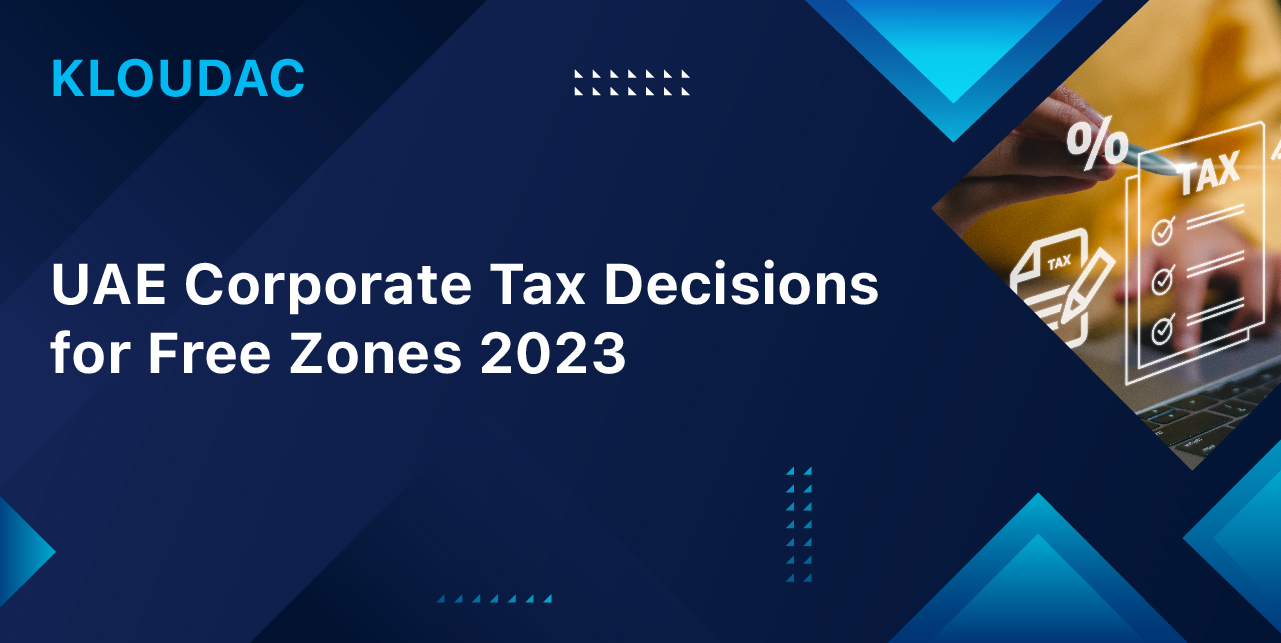The United Arab Emirates (UAE) has long been a beacon for businesses seeking a strategic and tax-friendly environment. In recent years, the UAE has witnessed significant developments in its corporate tax policies, particularly within the realm of Free Zones.
As we step into 2023, it becomes imperative for businesses to understand the latest corporate tax decisions affecting Free Zones in the UAE. In this blog, we’ll delve into the intricacies of these changes and explore their implications for businesses operating in the region.
UAE Free Zones
UAE Free Zones have played a pivotal role in attracting foreign investment, fostering economic diversification, and promoting international trade.
These zones offer businesses a host of benefits, including 100% foreign ownership, full repatriation of profits and capital, and exemption from import and export duties.
Historically, Free Zones have been synonymous with tax exemptions, making them particularly attractive for companies looking to establish a presence in the UAE.
Evolution of Corporate Tax Policies
In a bid to align with international standards and strengthen economic sustainability, the UAE has been gradually introducing changes to its corporate tax landscape. The introduction of Economic Substance Regulations (ESR) in recent years marked a significant shift, requiring entities operating in the UAE to demonstrate substantial economic activities within the country.
As of 2023, businesses operating in Free Zones are witnessing a nuanced approach to corporate taxation. While the overarching principle of tax efficiency remains, new considerations come into play, requiring businesses to assess their structures and operations.
Key Corporate Tax Decisions for Free Zones in 2023
1. Introduction of Minimum Corporate Tax
One of the notable changes in 2023 is the introduction of a minimum corporate tax rate for entities within Free Zones. While Free Zones traditionally offered complete tax exemptions, the new minimum tax underscores the UAE’s commitment to international tax standards.
Businesses are now required to factor in this minimum tax obligation and evaluate its impact on their overall tax liability.
2. Economic Substance Compliance
With the implementation of Economic Substance Regulations, businesses in Free Zones must ensure that they meet the specified economic substance requirements. This includes conducting core income-generating activities within the UAE, maintaining an adequate number of qualified employees, and having a tangible presence in the country.
3. Tax Treaties and Double Taxation Agreements
The UAE has been actively expanding its network of double taxation agreements (DTAs) to provide businesses with greater clarity on their tax obligations.
Companies operating in Free Zones should stay abreast of the latest developments in tax treaties to optimize their international tax planning and mitigate the risk of double taxation.
4. Enhanced Regulatory Oversight
Regulatory bodies in the UAE are increasing their scrutiny of Free Zone entities to ensure compliance with tax regulations.
Businesses should proactively engage with regulatory authorities, seek professional advice, and implement robust internal processes to navigate this heightened regulatory environment effectively.
KLOUDAC Accounting Firm Dubai, UAE
The evolving corporate tax landscape in UAE Free Zones reflects a delicate balance between fostering a business-friendly environment and aligning with global tax norms. As businesses adapt to the changes introduced in 2023, strategic planning and proactive compliance will be key to maintaining competitiveness and ensuring sustainable growth in the dynamic UAE market. KLOUDAC helps you Keep abreast of regulatory updates, engage with tax advisors, and continuously evaluate corporate structures will be essential for businesses navigating the intricate web of UAE corporate taxation in Free Zones.
